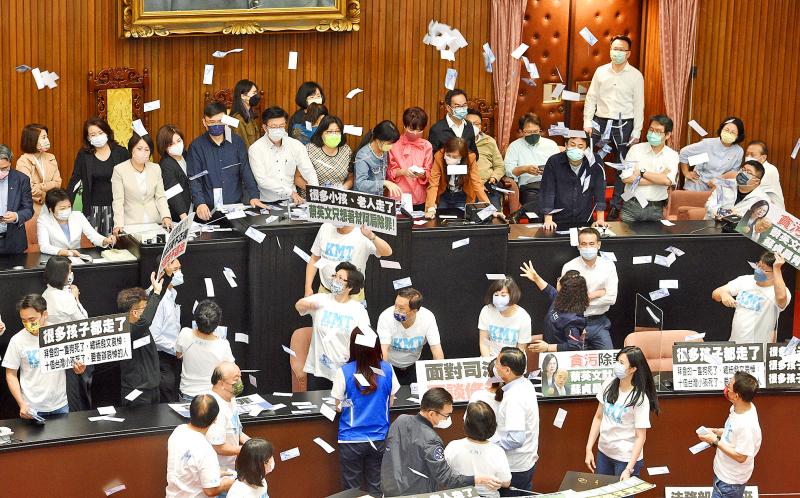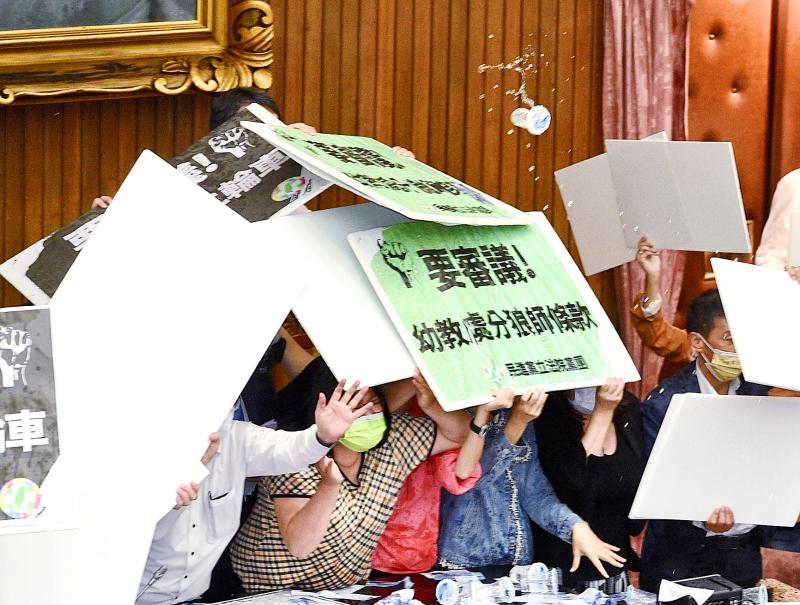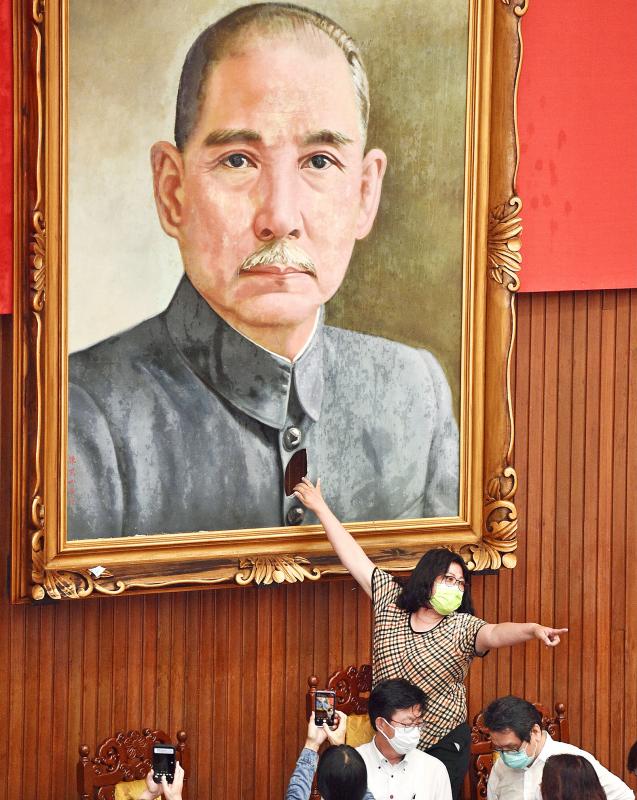The Legislative Yuan yesterday passed an amendment to exempt presidents from punishment over improper use of special funds prior to 2007, as scuffles over the proposal resulted in a tear in the portrait of Sun Yat-sen (孫中山) behind the speaker’s podium.
The change regards Article 99-1 of the Accounting Act (會計法), which absolves officials of liability for improper use of special allowance funds before Dec. 31, 2006.
“Special allowance funds” are those used by officials, apart from the president, for discretionary public relations purposes, such as rewards and gifts. They are categorically separate from the “special state affairs fund,” which is allocated by the president.

Photo: Peter Lo, Taipei Times
Usage of the funds has been a target for corruption probes into numerous officials, including former president Chen Shui-bian (陳水扁).
Defendants say that the purview of the funds is poorly defined, leaving them open to accusations of corruption.
Article 99-1, proposed by the Chinese Nationalist Party (KMT) and promulgated in 2011, was largely viewed as excluding the president’s special state affairs fund to avoid exonerating Chen.

Photo: Peter Lo, Taipei Times
The two fund types were separate in the 1940s and 1950s, but combined in the 1960s, the Democratic Progressive Party (DPP) said.
DPP Legislator Tsai Yi-yu (蔡易餘) and others therefore proposed an amendment to add the special state affairs fund to Article 99-1.
The KMT disagreed that the funds are functionally the same, accusing the DPP of trying to change the law to exonerate Chen.

Photo: Peter Lo, Taipei Times
KMT lawmakers in the morning occupied the speaker’s podium to protest the bill. The podium was later retaken by DPP members.
When Deputy Speaker Tsai Chi-chang (蔡其昌) entered at 10:05am to begin proceedings, KMT legislators threw fake money at DPP members standing at the podium, while shouting: “Fake COVID-19 prevention, real corruption, all to exonerate Chen.”
They also threw water cups that legislators blocked with signboards, one of which hit the large portrait of Sun, tearing a hole in the canvas.
The KMT caucus was unable to block the majority DPP from voting the proposal through.
With the amendment’s passage, no legal basis appears to remain for the life sentences handed to Chen and his wife, Wu Shu-jen (吳淑珍), or the 20-year and 16-year sentences given to former Presidential Office deputy secretary-general Ma Yung-cheng (馬永成) and his successor, Lin Teh-hsun (林德訓), respectively.
The Supreme Court yesterday said it would handle the cases according to the law.
DPP caucus whip Ker Chien-ming (柯建銘) said the two fund types are inseparable from their history.
In 1949, only Chiang Kai-shek (蔣介石) had access to special funds, but in 1951, access was extended to ministers and heads of the five branches of government, Ker said.
During the 1950s, special funds were granted to more officials, totaling up to 7,000, he added.
No matter what the funds are called, on the ledger they serve the same function and are a part of transitional justice, Ker said.
The New Power Party (NPP) caucus yesterday said Premier Su Tseng-chang (蘇貞昌) should use his constitutional authority to veto the amendment and return it to the legislature for a second review.
“While we believe that stakeholders involved in the controversies of state-secret affairs expenses in 2006 are entitled to seek justice through legal procedures, we strongly oppose the proposed DPP amendment because of the case involving former president Chen,” the NPP said.
While saying that the KMT set a bad legal precedent in 2013 by amending the same article to exonerate former KMT legislator Yen Ching-piao (顏清標) from allegations of misappropriating public funds, the NPP said the DPP yesterday again set a bad precedent by forcibly passing the bill at the legislature.
Additional reporting by Shelley Shan, Yang Kuo-wen and Hsieh Chun-lin

CHAOS: Iranians took to the streets playing celebratory music after reports of Khamenei’s death on Saturday, while mourners also gathered in Tehran yesterday Iranian Supreme Leader Ayatollah Ali Khamenei was killed in a major attack on Iran launched by Israel and the US, throwing the future of the Islamic republic into doubt and raising the risk of regional instability. Iranian state television and the state-run IRNA news agency announced the 86-year-old’s death early yesterday. US President Donald Trump said it gave Iranians their “greatest chance” to “take back” their country. The announcements came after a joint US and Israeli aerial bombardment that targeted Iranian military and governmental sites. Trump said the “heavy and pinpoint bombing” would continue through the week or as long

TRUST: The KMT said it respected the US’ timing and considerations, and hoped it would continue to honor its commitments to helping Taiwan bolster its defenses and deterrence US President Donald Trump is delaying a multibillion-dollar arms sale to Taiwan to ensure his visit to Beijing is successful, a New York Times report said. The weapons sales package has stalled in the US Department of State, the report said, citing US officials it did not identify. The White House has told agencies not to push forward ahead of Trump’s meeting with Chinese President Xi Jinping (習近平), it said. The two last month held a phone call to discuss trade and geopolitical flashpoints ahead of the summit. Xi raised the Taiwan issue and urged the US to handle arms sales to

State-run CPC Corp, Taiwan (CPC, 台灣中油) yesterday said that it had confirmed on Saturday night with its liquefied natural gas (LNG) and crude oil suppliers that shipments are proceeding as scheduled and that domestic supplies remain unaffected. The CPC yesterday announced the gasoline and diesel prices will rise by NT$0.2 and NT$0.4 per liter, respectively, starting Monday, citing Middle East tensions and blizzards in the eastern United States. CPC also iterated it has been reducing the proportion of crude oil imports from the Middle East and diversifying its supply sources in the past few years in response to geopolitical risks, expanding

Pro-democracy media tycoon Jimmy Lai’s (黎智英) fraud conviction and prison sentence were yesterday overturned by a Hong Kong court, in a surprise legal decision that comes soon after Lai was jailed for 20 years on a separate national security charge. Judges Jeremy Poon (潘兆初), Anthea Pang (彭寶琴) and Derek Pang (彭偉昌) said in the judgement that they allowed the appeal from Lai, and another defendant in the case, to proceed, as a lower court judge had “erred.” “The Court of Appeal gave them leave to appeal against their conviction, allowed their appeals, quashed the convictions and set aside the sentences,” the judges